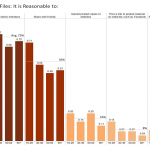Courtesy of an article in El Reg, I discovered an interesting report prepared by US think-tank American Assembly and Columbia University. Rather drily titled “Copyright Infringement and Enforcement in the US“, it’s a summarised set of results from an extensive survey of the America public.
Obviously, the US isn’t the UK and some of the findings may not necessarily be replicated here. But there’s nothing to suggest that this is an outlier; the results are consistent with what we already know. And, even to a Brit, the report is relevant because part of its purpose is to inform the debate over the US “Stop Online Piracy Act” which, if passed, will give the US government and US corporations extra-territorial powers over non-US websites.
The key findings of the report are, indeed, pretty much what we’d expect. The majority of music and film consumers engage in “piracy” – that is, unauthorised copying and filesharing – to at least some degree, but most of them confine that to low-level sharing with family and friends. By contrast, large-scale piracy is rare, with only 2% of music consumers and 1% of film consumers sourcing a large number of files from unauthorised sources.

Equally, the majority of consumers believe that sharing with family and friends is perfectly acceptable, from a moral viewpoint, but they do not have the same opinion regarding mass sharing across the Internet. If replicated in the UK, that has implications for the government’s response to the Hargreaves Review, where one of the consultation questions asks whether an exception to copyright for private copying should be limited to just the individual concerned or extended to their family or domestic circle. As I’ve previously pointed out, copyright law is explicitly a creature of stature, and cannot be derived from any underlying moral absolutes independently of public opinion. If a majority of people believe that a particular use of intellectual property is acceptable, then, in a democratic society, by definition it IS acceptable.
Other findings from the American Assembly research include such other no-brainers as
- There is virtually no support for onerous penalties for copyright infringement.
- For a majority of consumers, due process in such matters requires a court, not adjudication by private companies.
- Any form of penalty which includes disconnection – including a “three strikes” policy – is hugely unpopular.
- Even among those who support fiscal penalties, such as fines, the levels supported are considerably below those currently enforced by statute.
- A significant majority of American consumers oppose copyright enforcement where the means of doing so involves any invasion of privacy or restrictions on their personal rights and freedoms.
- The same majority opposes government blocking of websites and material.
As far as SOPA itself is concerned, the authors of the report conclude that the most likely practical outcome of the law – ISP-level blocking which also blocks some legitimate material – is opposed by 57% to 36%.
Other interesting results of the survey include the findings that piracy and legal acquisition are complementary – people with more fileshared material also have more purchased material – and, possibly surprisingly, increased levels of piracy correlate with higher incomes. This supports claims that people who use unauthorised downloads aren’t doing so because they can’t, or won’t, pay but rather because they are using filesharing as a “try before you buy” method or to fill in gaps in their collection that can’t easily be obtained legally.
Equally, the research also shows that piracy has also declined with the growth in accessible, convenient legal alternatives. Joe Karaganis, vice-president of American Assembly, told The Register that “All other things being equal, people prefer to obey the law”, but that “it’s overridden by price and convenience”. If legal services are too expensive or too cumbersome, people won’t use them. But, if they are offered at a price that people are willing to pay and in a format that consumers want, then people will use them. This corresponds with my own (admittedly very small) survey of Newzbin users who all claim that it’s convenience, not lack of willingness to pay, which pushes them towards piracy. It also tallies with the news from the BPI that digital sales have soared in 2011.
As with pretty much every report which is based on real research rather than corporate propaganda, this makes rather depressing reading for those who fondly imagine that the ills of the music and media industries are caused solely by unlawful filesharing and can be solved simply at the stroke of a legislative pen. But its good news for those of us who like our governments to develop policy on the basis of evidence rather than lobbying.
